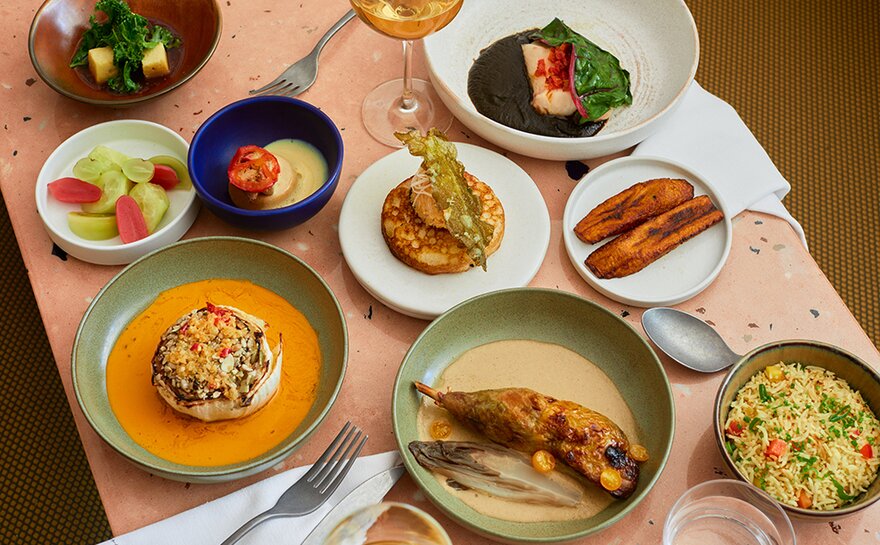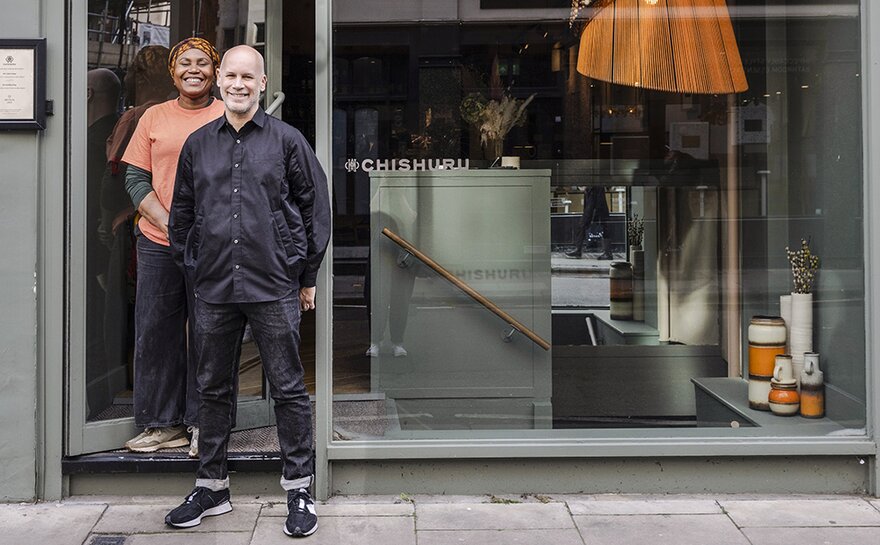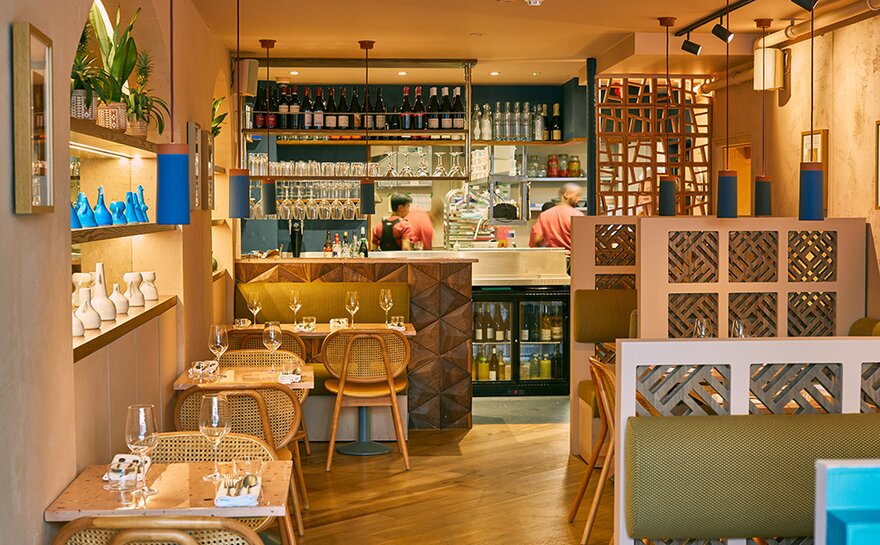Chishuru was the first restaurant in the UK with a Black female chef to be awarded a Michelin star. Jungmin Seo meets Adejoké Bakare to see how she won her star in five years
Adejoké Bakare, founder and head chef of Chishuru, is basking in the afterglow of the 2024 Michelin Guide Great Britain & Ireland ceremony, held at Manchester's Midland hotel in February. While chefs exchange hugs, catch up with colleagues and dance to live music in their starry chefs' jackets, Bakare takes a moment to absorb the atmosphere of reunion and camaraderie for the first time.
"I never thought Michelin would look at us because we're not your normal restaurant – we're not French-based. I've always wanted to work at [Michelin] standard, but we never thought [we would win a star]. Never, never," Bakare says, looking around the Midland Lounge, which is bustling with chefs and restaurant managers who have just spilled out of the lively ceremony. She is sitting in a quiet booth, tucked away from the crowds, still a little dazed from the evening's events. Our conversation is punctuated by chefs expressing their admiration for her as they walk past.
Bakare was the final person to be invited to the stage to collect her star, following a special announcement by the director of the guide Gwendal Poullennec, who praised her "punchy, West African flavours" at her second iteration of Chishuru, which opened in London's Fitzrovia last September. She was one of two West African restaurants to be recognised at this year's awards, alongside Aji Akokomi and Ayo Adeyemi's Akoko. Bakare was somewhat reassured by this, as it indicated the that guide understands that West African cuisine is "not a monolith".
"What [Akoko] does is very different to what we do, and each is authentic to its heritage, so I just feel amazed that more people will be looking at us," says the UK's first Black female Michelin-starred chef. "More young people will feel ‘oh, OK, it means I can cook the food my mum cooks for me', so it's a compliment."
Pop to the top
Michelin was keen to point out that its inspectors had been following Chishuru's journey. It began as a three-month pop-up in south London, a prize Bakare received after winning the amateur round of the Brixton Kitchen Competition in 2019. That particular year produced an impressive alumni, including Budgie Montoya of Sarap, who won the experienced category (the pair would later go on lunch breaks together in Brixton), and Jack Croft and Will Murray of what was to become Fallow, who came runners-up. Bakare recalls how she entered the competition serendipitously: "I was talking to a friend of mine and I'd made up my mind to give it one last go – one more go at trying to get a place to showcase this food that has been in my heart for so long," she says, when we reconvene in March.
"The very next day I was going into work in north London and I saw the advert in the Metro newspaper. Something just clicked and I sent in my application form at 10 minutes to midnight."
The 32-cover Chishuru Brixton was Bakare's first foray into running a restaurant full-time. Prior to that, the Nigerian-born, self-taught chef had only held a couple of supper clubs for friends and family at home or at Hackney's Well Street Kitchen, while juggling her day job. Concerned over her lack of restaurant kitchen experience, she turned to the judges of the competition for support and with Jackson Boxer stepped up to train her up behind the pass at Brunswick House, in Vauxhall. She spent roughly four months shadowing the chefs there three times a week in the lead up to her September 2020 opening.
"Having my own place was a big leap, so that short time there helped give me a little bit of confidence," she recalls. Bakare is still thankful for Boxer's continued mentorship: "He was one of the first people I called to ask for advice and he was always keen to take his time, be a good ear and give me good tips. He's been really, really helpful when I'm doubting myself or at a crossroads."
One of the most memorable pieces of advice from Boxer was to stay attuned to "the vision for the place". She explains: "What is it that you are intending? [If you] have a clear vision of what it is that you want, how you operate will stem from that."
Although she has never wavered on the identity of her restaurant, she has beenchallenged by the misconceptions around West African cooking and the heightened expectations that come with being a Michelin-starred restaurant. Bakare's business partner and friend Matt Paice, who oversees front of house, says Chishuru faced a "perception problem" when it was originally based in Brixton between September 2020 and October 2022. People assumed it was an "ethnic restaurant in an ethnic area, and therefore people would be walking out stuffed to the gills", when in reality it was offering a reasonably priced set menu for £30. "That was one of the reasons why we moved to central London, because it primes customers just a bit more," he says.
Star quality
Since winning a star just five months after the opening of the revamped 50-cover Chishuru near Oxford Circus in September 2023, the pair are realising they have yet more explaining to do. Andrew Wong of two-Michelin-starred A Wong in Victoria in London gave Bakare some thoughtful pointers about this at the ceremony. "I don't do it at his level, but both of us do food that is ‘ethnic', and there's a certain perception of how that is supposed to be," she admits.
Paice adds: "One of the really fascinating things about having a Michelin star is that when we get [some] reviews now, people say the food was awful, the service was terrible and I couldn't believe it has a star. It kind of turbo-charges people's attitudes." In the grand scheme of things, negative reviews are few and far between, but he speaks candidly about the 2% that exist. "People think: ‘It's got a Michelin star. They're going to roll out the red carpet for me.' Michelin left that behind a long time ago, but some customers haven't."
It's another reason why Chishuru refuses to call itself – let alone associate itself with – a fine dining restaurant. In fact, the pair never refer to a tasting menu, only a set menu. It's an important distinction, as the set menu is a list of defined suggestions to help diners navigate a culinary region that is new to most.
"My style has completely changed since the supper club days, because then it was mainly sharing plates. When we first started in Brixton we thought we would go à la carte, but we quickly realised it wasn't going to work, because people had no reference point to what they were eating," she explains. "I try to shy away from elevating [a cuisine]. It is about making it more accessible, so people can have a reference point. I don't want to take away too much from the food itself; I want to keep it as close to the heart of what it is as possible."
Bakare is keen to emphasise that Chishuru never really changed. Although it has scaled up significantly, both in terms of physical size and staffing (during the first year Bakare was cooking on her own; now, there's around 20 workers split between front and back of house), her passion to cook "really delicious and interesting" food remains.
"We are able to explore other avenues of doing it better, but at the heart of it, it will always be Chishuru. That's why I keep saying to people we can't have two Chishurus, because this is it," she says. Paice playfully forbids Bakare from ever adding a "caviar supplement" to her menus, to which she teasingly responds: "You are giving me ideas, Matt. Moin-moin [steamed or boiled bean pudding], foie gras and caviar – wow."
On the up and up
But there's something else to be said about the jokes around stereotypical fine dining, as the pair are considering premiumisation through price hikes. The £75 dinner will rise to £95 from 30 April, and the £40 lunch will jump to £50 from 8 April. Although Bakare knows the move won't please everyone, it will reflect an increased amount of dishes and higher-quality ingredients. In short: "We're upping the price so that we can offer a bit more value."
The growing recognition for Chishuru has also contributed to a big increase in the number of chefs applying for roles. Many of them are experienced, few have a background in West African cooking, but all of them have an "open mind to learn", Bakare says. While this has meant kitchen staff are always at a stable level, staff shortages have been more pronounced in front of house roles. That said, these are gradually filling up: "We just hired someone who came in for dinner and said ‘please can I work here'," Paice adds.
Chishuru's menu changes every six weeks, but some staples reappear in familiar forms. The Financial Times' Tim Hayward raved about the "combination of bosky and sweet" in the sinasir (northern Nigerian rice pancake) with fermented rice, maitake and chestnut mushrooms during his visit last year. In its current guise, the tangy sinasir is served with squash pumpkin purée and pressed cucumber. To make the pancake, Bakare soaks pudding rice, jasmine rice and sticky rice in different proportions and blitzes the mix with rice milk, ginger, garlic and onions. This is left to ferment "like a sourdough starter", then fried and shaped as required. Another purée is made from diced squash, which is blanched and cooked in a pickled liqueur, combined with compressed cucumber and pumpkin purée, which contains dawadawa (fermented locust beans), cloves, uda (see panel), peppers, and nut milk. All of this is blended together in a processor and spread on the pancake, offering a unique combination of earthy, sweet and savoury.
Meanwhile, Jimi Famurewa from the Evening Standard praised the ekuru (a Yoruban delicacy made from peeled beans) for "pacifying starch complexity". The dish is emblematic of Chishuru's signature bold and spicy flavours and features black eyed beans with steamed watermelon seeds, pumpkin pesto, herbs, chilli and preserved lemons.
But the review that started everything, according to Bakare and Paice, was the November 2020 article from Jay Rayner in The Observer, who described Chishuru as "a portion of the community on a plate [that] deserves to be shown some serious love".
Considering Chishuru now deservedly has its fair share of that, Bakare hopes this prompts others to widen their palate.
"Food critics play a huge part in people's perceptions and sense of discovery. If they can go out and eat at different places and open people's minds to it, then the cuisine will be much more common," she says. "It won't be such a novelty anymore."
From the menu
Waina Rice and coconut ball stuffed with braised beef shin, Thai basil and green chilli sauce
Moi moi Bean cake, lamb broth-cooked tomato, shrimp risotto, salted egg sauce
Peppersoup Pickled oyster mushroom, compressed beetroot, apple, uziza leaf
Ebiripo Grilled celeriac cake, fermented cabbage, compressed apple, wild watermelon seed sauce
Imoyo Newlyn cod fillet, fermented tomato sauce, Scotch bonnet, okra
Mafe Mutton cutlet with coffee and yaji dressing, peanut, uda and uziza sauce
Moringa biscuit, soursop ice-cream, burnt marshmallow Clementine, pomelo and grapefruit, timur pepper
Bakare's top five spices
Uda Also known as Grains of Selim, this is a local spice in Nigeria with a smoky flavour reminiscent of liquorice.
Calabash nutmeg Also known as monodora myristica, this spice is used across West African cuisine and loved by Bakare for its earthy notes.
Uziza This is a fruity, aromatic pepper native to West Africa known for its versatility. Bakare uses it in sweet desserts becauseit can impart a "hint of floweriness".
Cardamom Bakare uses this native South Indian spice in her ice-cream dish.
Yaji A Nigerian spice mix that normally contains a mix of ground chillies, ginger, garlic, onion, locust beans and ground peanuts. Bakare likens it to garam masala or Chinese five spice and uses it to finish grilled meat, and, on some occasions, on sweet dishes. The yaji that is used at Chishuru is sourced from a yaji spice maker in Nigeria, who Bakare has known since she was in primary school. They remain family friends.
Continue reading
You need to be a premium member to view this. Subscribe from just 99p per week.
Already subscribed? Log In












